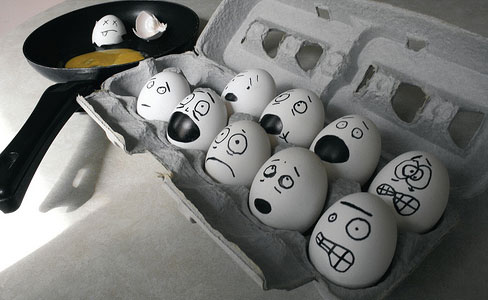
As a young man, I was given a lot of responsibility. Spending eight years in an elite school for cooking and working as a chef in world-renowned restaurants, I had my fair share of Gordon Ramsay moments.
After years of experiencing those kitchen nightmares, I learnt a lot but one thing in particular: we all deal with stress in different ways.
Many years later I found meditation and quickly made teaching meditation my full-time profession. I learnt to understand stress on a fundamental level, but my experience from the kitchens of my youth stuck with me.
While lecturing about stress during stress reduction courses, I realised that people first need to know how stress affects them personally. It affects each of us all a little differently, yet when we figure out our stress type, we are halfway to defeating our stress.
As the saying goes, “Sunlight is the best disinfectant.” We have to be aware there is a problem before we can change it.
So what are these stress types?
Well, how humans react to stress can fit within three responses—three “stress types.” The stress types are fight, flight or freeze. Most of us respond with one of these three stress types more than any other.
Each type has a selection of sub-groups, and these are where we can start to really pick out our responses to stress:
The Running on Empty
We will push ourselves until we are forced—by mental or physical exhaustion—to stop. We might talk about how we enjoy our stress, or we might deny that we are stressed at all. Either way, we often leave little of ourselves for friends, family, or simple pleasures. Friends and partners find it difficult to connect with us and can often decrease contact with us as they become more challenged, intimidated or simply bored by our single-pointedness.
Positive side: We often have an amazing degree of compassion, when others, or ourselves, realise it. Direction and single-mindedness are by no means bad things. Initially sceptical of stress treatment, we often respond well with an open mind.
How to deal with it: Do less. Rest is fuel for work. If we believe ourselves to be a productive person, it makes sense that we learn to rest in a productive and intelligent way. We can take a short walk around the block each work break. We will quickly find these little walks help us work smarter and to feel more present. (This tool’s a tested favourite of mine.)
The Dash & Burn
We will charge into a stressful situation and often find ourselves in the middle of one. Able to bring massive amounts of energy to a stressful event, we can often get things done quickly, if we can last long enough. Usually we bring too much energy, and find ourselves too deeply involved, eventually wearing us down. A few simple mistakes at the wrong moment shatters our will, and we crash. All of that energy goes into self-blame, feelings of worthlessness and a loss of meaning in what we do. We can become needy of those around us, and overindulge in junk-food, movies or self-pity to fill the space where all that bright, bouncy, energy was.
Positive side: Great amounts of energy are attractive. And we can certainly get things done. Knowing how to be vulnerable when feeling burnt-out is a worthwhile skill. Although we have a tendency to overindulge, it’s usually not with something too damaging.
How to deal with it: Forgiveness. Like most stress types, if we’re a dash and burn person, we’re in it for life. But that doesn’t mean we can’t reduce the burn and pace the dash. When we offer ourselves forgiveness for our inevitable burnouts, we find our burnouts don’t last so long. When we offer ourselves forgiveness for our small mistakes, we find our dashes to be less fragile.
The External-er
We will look at everyone and everything in the stressful event as the enemy. We walk through a room and we can feel that people don’t want to get in our way. Prone to outbursts, or oppressive silences, we can see problems that others can’t, which sadly leaves us to believe that others around us are incompetent or stupid. The last person we see as a problem with is ourselves, but that day comes—and then we become our own enemy. Eventually pushing and blaming ourselves until we burn out and feel sorry and guilty for always being on the attack, and for fighting enemies that weren’t enemies at all.
Positive side: Better out than in. Seeing hidden problems is a powerful skill. Some guilt or shame is always felt, which shows that we’re human underneath it all.
How to deal with it: Meditation. By meditating five minutes each day ,we will find little gaps between our outbursts. Little moments will arise where we have more control, and we will realise that it’s all in our head.
The Over-analyst
Planning every form of attack but always one step, plan or piece of knowledge away. The over-analyst is the classic micro-manager. We continue to build a case, establish a foundation, waiting for the perfect time to strike but that time is often too late. We can often deny the stress we are experiencing or over-analyse our stress to the point that we realise that our stress is just another problem to solve before we can fully enact our plan. Over-analysis leads to more stress, which leads to more over-analysis.
Positive side: Planning is a powerful skill. And so is looking at something from all angles. It shows an ability to question the self, which is healthy.
How to deal with it: Act. Make a move. The best information comes from doing—mistakes are high quality information. Ninety percent of decisions can be reversed with little cost and acting early (instead re-living of endless mental debates) can save us time. Clever, intelligent people we respect know the power of action, let’s get on board.
The Smiling Tiger
The psychoanalytic term for this is reaction-formation. And it’s exactly what it says, we will come at our stress with a faux positive attitude, which can feel to others as brittle, or passive aggressive. This often shows us the reality of this stress type. Time has been spent building a tough and fair exterior, when deep down we are deeply emotive. We tend to be passive aggressive and will often snap and then apologise, never mentioning it again because we feel ashamed of our emotions. When the time comes for burn out, we often spend a lot of work on bettering ourselves, trying to “fix” our broken emotions or trying cover them up, (thus perpetuating this unhealthy stress reaction).
Positive side: Trying to be a “better person” is admirable. And passive aggression is better than downright aggression. Our drive to better themselves shows that we deeply care about how others feel.
How to deal with it: Our new motto is, “I’m not something that needs to be fixed”. As Smiling Tigers, we often rub salt into our wounds with hating our hate, or stressing about our stress. Now, when stress arises, we can attempt to avoid fighting against our stress—accepting our stress as it is, allowing space for it. We can smile at our humanity and watch our smile change from tiger, to tibetan monk.
The Long Fuse, the Repressor
We are able to withstand a massive amount of stress for a long time without seeming like we struggle, or even feeling a struggle ourselves. Eventually though, if the stress lasts long enough, we start to show contempt, or unusually strong opinions about things that we never did before. Seemingly irrelevant things. A partner might point this out, or we might realise it ourselves. Something has changed. This strange aggression is either picked up and worked with or left unrecognised until we harbour some intense views on topics that would seem out of character for us. For us repressors, the mind eventually finds an enemy, and a lifetime of built-up stress is directed towards this “enemy” with a frightening lack of forgiveness or understanding.
Positive side: Holding strong for so long is a godsend. The world is supported on the backs of people like us. Strength, awareness and duty are certainly on display here.
How to deal with it: We can take a moment for ourselves, close our eyes, and tell our emotions that we are there for them by saying, “I care about my suffering” a few times. Feelings will come up, treat them as a good friend, welcome them in, listen to them. They’ll leave when they’re ready, and we’ll feel lighter and better for it.
We all deal with stress differently but once we recognise our stress type, we can deal with our stress intelligently, using our mental tools and common stress reduction techniques. Then it’s only a matter of time before we can live a more calm, balanced and productive lifestyle.
Now, if only someone please pass this article on to Gordan Ramsay…
~
Author: Ed Mark
Image: Bernard Goldbach/Flickr
Editor: Katarina Tavčar






Read 1 comment and reply